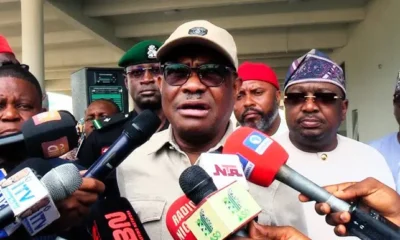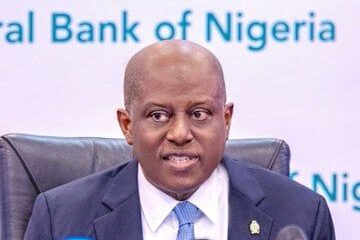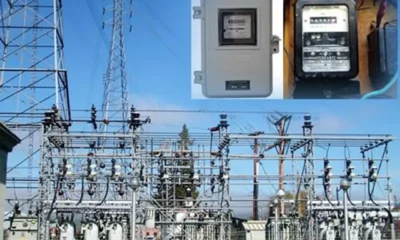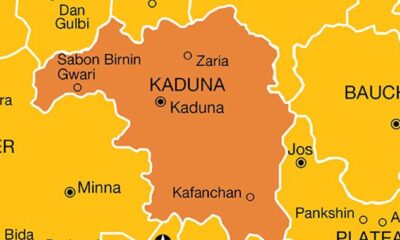Metro
Lagos Underbridges: Where Criminal, Legitimate Businesses Cohabit
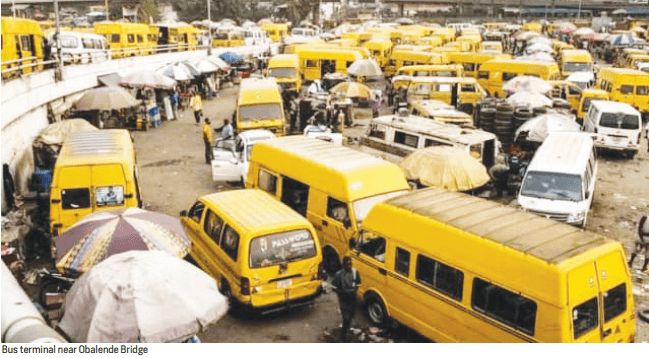
For a number of Nigerians battered by the cost of living crisis, seeking refuge under bridges provides temporary succour. However, in recent times, there are concerns over the activities of such occupants and how the stability of the structures could be threatened.LADESOPE LADELOKUN reports
Ordinarily, bridges are built to ease gridlocks, cut travel time, and enhance connectivity. But a tour of bridges across Lagos reveal more
From the almost completed Opebi-MendeOjota Link Bridge to Odo Iya Alaro Bridge, Idumota Bridge to Obalende Bridge, findings reveal how bridges shelter the down and out, provide havens for criminals and give opportunities to legitimate business owners to flourish.

Under Obalende Bridge, criminals, legitimate businesses coexist
As the afternoon gradually crawled into evening, the brightness of the Sun was fast fading on Wednesday, October 15. But there was no slowing down in the boisterous business activities under the Obalende Bridge. Less than a minute walk under the bridge, a giant bag of weed could be seen in front of a young man, probably in his 20s, as fierce-looking men took turns to buy wraps of Marijuana from him, fresh from the bag into what appeared like Rizla rolling papers. Not far from the Marijuana stand was a scrap-metal buyer, who beckoned to this reporter, seeking to be patronised. “One kg is N550,” he responded when asked the price per kilogramme. Beside him was a pet bottle buyer, who told this reporter he pays N500 per kilogramme. “I can’t give you my number. If you want to buy, come down here. I will take you to where you can buy in bulk. I can only tell you it is N500 per kilo. If you are ready,I’ll take you there.”
A journalist’s close shave with death
“Let me check your phone, you are videoing us,” a lout thundered. Angered by the refusal of this reporter to hand in his phone, he raised an iron rod, threatening to hit him with it. Almost immediately, more louts stormed the scene to chorus the same demand. The already charged atmosphere had elicited fear of the unknown as this reporter reluctantly surrendered his phone to the gang. As every touch on the phone made the heart beat faster, the most dreaded moment came – they found their pictures. “What are they doing here ? You want to ‘cast’ us?”, they queried. Expectedly, a rain of punches and slaps descended on this reporter. “Strip him,” one of the hoodlums shouted as they deleted the pictures. Instantly, the buttons of the shirt worn by this reporter vanished, but the order was overturned by another comrade. Then, before anyone could say Jack, a cane and a horsewhip-wielding masquerade appeared, beating the captive in the net of the street urchins. Hope of an escape from hell surfaced when a policeman intervened. In spite of the intervention, the assault would not stop. This was even as the Obalende Under Bridge hoodlums requested the sum of N50,000 for bail. “You are paying us N50,000. Else, we will throw your phone inside the canal and continue to beat you here. There is a POS agent nearby. Go there and withdraw our money for us,” a hoodlum ordered. There and then, the policeman appealed to a member of the gang to let peace reign by ‘extorting’ only what this reporter can afford. Freedom eventually came after all the cash on this reporter was taken. Not satisfied, a chase on the streets of Obalende followed after the Policeman had left, to steal and torture more, but it was a narrow escape.
Odo Iya Alaro Bridge: Conversation with a ‘mad man’
Under the Odo Iya Alaro Bridge, the homeless do not only get shelter, it is a business hub, a worship centre, and a football pitch. Sleeping in his makeshift bed on a Wednesday afternoon was a young man, who simply gave his name as Chinedu. Until a conversation was started with him, he had been mistaken for a mentally challenged man. With his bushy, dirty hair and oblong face hosting an unkempt goatie, he cut the picture of one needing medical attention, especially as he was dressed in tattered black shirt and trousers. Done sleeping, he rose, walked barefooted to an unknown destination. Before long, Chinedu returned with a black polythene bag. He had gone to buy eba and egusi soup. This reporter joined him in his bed and handed him a N200 note. A smile immediately lit up his face and a gratitude followed as he said: “Thank you, my brother.”Then, Chinedu unknowingly got interviewed.
Sunday Telegraph: What do you do here?
Chinedu: I make cane chairs and baskets.
Sunday Telegraph: Is this where you live?
Chinedu: Yes, I’m not alone here. My colleagues also sleep here.
Sunday Telegraph: Don’t you think it’s dangerous to sleep here
Chinedu: I don’t know about that. I have no money to rent. What do you want me to do?
Sunday Telegraph: Your family knows you live here?
Chinedu: Yes, they do. What can I do for you? What do you want from me? Sunday Telegraph: Hmmmm…I’m considering doing business with you. Now that I know that you are here, I will come back. Chinedu rose and walked away, promising to be back shortly. Returning with a stick of cigarette in his hand, he said it was time to hunt for customers. Behind Chinedu, a man was seen repairing a generator. A mini Mosque was also seen near his bed space as Muslims were seen praying. Directly beside the Mosque, scrap metal buyers were seen with their scales.
I’ve lived under Obalende Bridge for 30 years- Scrap-metal seller
In an interview with the British Broadcasting Corporation (BBC)last year, Liya’u Sa’adu revealed he had lived half his life under the Obalende Bridge. According to the BBC, Liya’u Sa’adu sees himself as the “guardian” for the many other homeless people, who have joined him there,noting that more than 60 men now live in the tightly knit outdoor community – with the busy and noisy Obalende Bridge over them – as renting even a shack has proved unaffordable for them. “I am 60 and there are young people who came here a few months ago or a few years ago. I see it as my responsibility to guide them. It is so easy to lose track here in Lagos, especially for young people because there is no family to watch their steps,” he told the BBC.
During his three decades in Lagos, Mr Sa’adu is said to have progressed from being a shoe-shiner to being a scrap-metal seller – picking up metal from the streets and workshops for a business that sells it on for recycling;something that earns him an average of N5,000 a day, above the extreme poverty threshold of $1.90 a day but barely enough for him to survive. “Don’t forget I have to also send money to my family back in Zamfara every week. So, it is a continuous struggle. “Considering what I do, it’s difficult to save enough to get a decent place to stay. “I am already used to the sound of cars. It doesn’t affect my sleep at all, especially after a tired day.
The people, who come here know someone, who is already staying here or have a contact who told them about Karkashin Gada(under the bridge).When I came here, there were less than 10 people,”he said.
Sanity restored at Opebi-Mende Bridge?
Following an unscheduled inspection of yet-to-be-commissioned Opebi–Mende Bridge, on October 9, the Commissioner for Environment and Water Resources, Mr Tokunbo Wahab, alongside the Special Adviser to the Governor on Infrastructure, Olufemi Daramola, and the Permanent Secretary, Olatokunbo Oyenuga, ordered the immediate eviction of squatters and traders, who had converted the space beneath the bridge into makeshift homes and shops. According to a statement signed and released by the Director of Public Affairs, Ministry of the Environment and Water Resources, Mr Kunle Adeshina, Wahab ordered the security agencies to carry out the demolition of illegal structures under the bridge and the dislodgement of squatters. “The Lagos State Government has given a marching order for the immediate dislodgement of all types of squatters, who have converted the underbelly of the new but yet-tobe-commissioned Opebi–Mende Bridge into homes and stores. “It is disheartening that an iconic project which is almost ready for commissioning, has suddenly been taken over by different shades of miscreants and squatters.

“Even some people from the Cane Village have come to the underbelly of the bridge to create an illegal settlement. We will not only dislodge them but also permanently monitor the location to ensure they do not return.” Meanwhile, when Sunday Telegraph visited the bridge on October 15, it was observed that the directive of the Commissioner had been effected. The homes and stores that hitherto occupied under the bridge had disappeared.
Also, squatters and traders were no longer seen around the bridge. The project, which was initiated by Governor Babajide Sanwo-Olu, was flagged off on January 26, 2022. Once completed, according to the contractor handling the project, Julius Berger, the 4.52-kilometre-long bridge will open into Ojota axis in Kosofe, diverting traffic from Opebi U-Turn and connecting to Ikorodu Road via an intersection that will be constructed under Odo Iya Alaro Bridge at Mende, noting that its scope of work includes the construction of bridges, U-turns and underpasses, as well as the reconstruction of the existing Opebi Road and Maryland U-turn. “The Opebi–Mende Link Bridge, upon completion, will be a major relief for commuters, alleviating traffic gridlock at Opebi, Mende, Maryland, Ojota and Mobolaji BankAnthony Roads,” it added. Also, in February, the state environmental sanitation corps carried out a clearance operation under Idumota Bridge.
The corps noted that the bridge harboured criminal elements and other illegal activities. Along with the video of the operation shared on the X handle of the Lagos Commissioner, Ministry of Environment and Water Resources, Tokunbo Wahab, the commissioner wrote: “Following the expiration of served notices, our dedicated Lagos Environmental Sanitation Corps #LAGESCOfficial KAI have commenced clearance operations under Idumota Bridge, harbouring criminal elements and other illegal activities. “AWMA staff are on the ground, diligently carting away removed materials to restore and maintain this critical corridor.
“Our unwavering commitment to enforcing environmental laws and ensuring public safety is at the heart of these efforts. Every step we take brings us closer to a cleaner, safer Lagos for all.” How construction worker stole metal under Opebi-Mende Bridge, sold it under Odo Iya Alaro Bridge Looking tired and famished, a yet -to-beidentified man was seen approaching Odo Iya Alaro Bridge from the newly constructed Opebi-Mende Bridge. Dressed in Julius Berger Company outfit, giving him away as one of the workers engaged to render services for the construction of the bridge as he held a cement bag that contained a metal he decided to sell to buyers under the Odo Iya Alaro Bridge.
“I’m looking for the money to transport me back home,” he told the buyer as he brought it out for scaling after which he was paid N4,500. Further checks under the OpebiMende Bridge revealed that the same metal was still being used for construction. Also, the same man who sold the said metal was later seen working with his colleagues under the Opebi-Mende Bridge.

Under Dolphin Estate Bridge with 86 apartments, illegal activities flourish
Last year, the Lagos State Commissioner for Environment and Water Resources, Tokunbo Wahab, stated that the government discovered 86 apartments under the Dolphin Estate Bridge, Ikoyi, where tenants pay N250,000 annual rent. In videos posted on his X account, Wahab said the enforcement team of the ministry had successfully removed all structures, including a container utilised for various illegal activities, from beneath the Dolphin Estate Bridge. The commissioner wrote: “18 individuals squatting illegally under the bridge leading from Dolphin Estate were arrested yesterday, 30th of April, 2024 by the officials from the Lagos State Environmental Sanitation Corps” “A total number of 86 rooms, partitioned into 10×10 and 12×10, and a container used for different illegal activities were discovered under the Dolphin Estate Bridge.
“They have all been removed by the enforcement team of the Lagos State Ministry of the Environment and Water Resources.” Confirming the eviction of the settlers, a Special Adviser to Governor Babajide Sanwo-Olu, Kunle Rotimi-Akodu, said: “These people created their illegal settlement under the bridge, thereby exposing the critical infrastructure to impending destruction. Twentythree persons have so far been arrested and MoE/KAI will continue to monitor the place. The law will take its course.”
We’ll ensure Lagos is safe for all – LASG
In a chat with Sunday Telegraph, the Special Adviser to Governor Babajide Sanwo-Olu on Media, Gboyega Akosile, assured residents that the Lagos State government would continue to protect the interest of citizens. “I want you to know that the Lagos State government is doing all it can to rid the state of all manner of criminalities. But there are some flashpoints.
That’s not to say the government is not attending to the issues. As you are well aware, Lagos remains the safest state in Nigeria. We are doing a whole lot to protect the interest of citizens. “I can guarantee you that the state government will continue enforcement and ensure that we leave no stone unturned to rid the state of criminal elements. We are working in partnership with the police and other security agencies to achieve this purpose. Lagos will continue to be safe for every citizen, who is in this state to do their lawful businesses. There is no cause for alarm.”
Activities of occupants could threaten stability of structure – Ex-NIOB
President Former President of the Nigerian Institute of Building(NIOB), Kunle Awobodu, warned that activities of people living under bridges could compromise their stability. He explained: “The practice of people living under the bridge is a pointer to inadequate housing schemes in the country. It is abnormal for people to go and live under the bridge.
That is the first negative signal. Then, activities of occupants under the bridge could become a threat because some of them cook under the bridge; they do a lot of other activities. At times, they do some excavations under the bridge. This could be a threat. Living under the bridge could also be a security threat because when a vehicle breaks down at an odd hour, you don’t know who will come and attack you. So, basically, it should be discouraged since their activities can be detrimental to the stability of the structure.”
We’re not resting on our oars -NSCDC
Commenting, the Public Relations Officer of the Nigeria Security and Civil Defence Corps , Lagos State Command, Oluwaseun Abolurin, said the corps would not relent in its efforts to protect public utilities, stating its commitment to checking illegal and unauthorised activities.
“For the NSCDC in Lagos, what we have done under the present commandant, Mr Keshinro Adedotun, is to continue to ensure public awareness in the area of the responsibilities of people whose communities host public utilities. Recently, the office of the National Security Adviser also directed the commandant to ensure that illegal and unauthorised activities are not allowed under the bridges in Lagos, especially along the coastal lines.
“We are talking about the Eko Bridge, the Carter Bridge, and the Third Mainland Bridge. And to achieve that, stakeholders meetings were held two weeks ago, bringing all stakeholders from ministries of works, minerals and energy resources. The President of Dredgers Association of Nigeria was there. And it’s an ongoing engagement to ensure that the places are inspected and responses are made. We are not resting on our oars.’’
Consequence of misgovernance
According to the Deputy Chairman, Joint Action Front, Achike Chude, Nigeria’s huge poverty population and misgovernance would naturally fuel homelessness. “What strikes me when I see people living under the bridge is the state of want, deprivation, poverty in the land. As a result of misgovernance, homelessness is generated. It speaks volume about the level of poverty in the country. What you see is an expression of the difficulties Nigerians face. According to the World Bank, Nigeria has about 139 million people facing poverty. Nigeria has a large population of poor people,second only to India. So, when you have this level of poverty, what you see under the bridge is a consequence misgovernance.’’ (New Telegraph)
-

 Opinion16 hours ago
Opinion16 hours agoLeft behind but not forgotten
-

 Politics16 hours ago
Politics16 hours agoWe Don’t Need Gov’s Support To Deliver Rivers For Tinubu – Wike
-

 News16 hours ago
News16 hours agoTinubu’s ambassador-designates in limbo
-

 Business16 hours ago
Business16 hours agoCBN raises alarm over Nigeria fintech’s foreign reliance
-

 Politics16 hours ago
Politics16 hours agoWe’ve no plans to impeach dep gov — Kano Assembly
-

 News16 hours ago
News16 hours agoN7 Trillion, Four Presidents, Nigeria Still In Darkness
-

 Politics16 hours ago
Politics16 hours agoElectoral Act: Amendment yet to be concluded – Akpabio tells critics
-

 News16 hours ago
News16 hours agoKaduna Residents Protest Displacement Of 18 Villages By Bandits, Closure Of 13 Basic Schools





